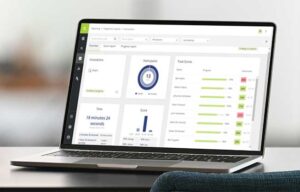
Need better measurements of learning gains?
Collect the required data and insights through digital assessments
Being able to measure learning gains objectively is high on every educational agenda – even more so now that remote or blended learning is increasingly common in addition to traditional teaching. You need better data to keep track of your students’ learning curves, and you can generate such data simply and comprehensibly with digital assessments.
“Digital assessment can be used flexibly, before and after learning periods or mid-term. It also has other advantages over paper-based assessments,” says Joris Vanholme, General Manager of Televic Education. “It’s easy to analyse online results. This data gives examiners and teachers immediate insights into what their students have or haven’t mastered. In addition, online assessments can take various forms, making them more attractive for students. So, it’s a win-win for everyone.”
Formative or summative assessments?
 There are two possible purposes for digital assessments: summative and formative.
There are two possible purposes for digital assessments: summative and formative.
- Summative
The traditional exam that concludes a learning period is an example of summative assessment. It is a momentary snapshot where the focus is on the end result. This kind of assessment does not tell us much about the learning curve. - Formative
In contrast, formative assessment is more suitable for monitoring learning curves. This kind of assessment occurs mid-term, following which the teacher gives feedback to the student. This way, students will know what areas they need to focus on before their final exams.
Joris: “We believe that measuring learning gains is an and-and story, with formative assessment reinforcing summative assessment. That is why our online examination platform, assessmentQ, allows you to combine both types.”

Let’s talk!
Schedule a short call with one of our experts, free of obligation. They will be happy to listen to your needs.
Two misconceptions about digital assessments
“The main misconception about digital assessments is that they are just digital copies of paper versions. If you limit yourself to thinking that, you’re not taking advantage of the additional digital possibilities,” says Joris.
“Furthermore, all too often, digital multiple-choice questions are seen as the only option for formative assessments, while they are just one option among many. In fact, we provide more than 25 types of questions on our platform, And you can use these to assess different types of knowledge and skills,” he explains.
“You select the type of exercise appropriate for your subject or skill,” continues Joris. “In medicine, for example, if you want to ask about the exact location of a muscle, multiple-choice questions are pointless. Drawings or pen marks would be much more appropriate. Language teachers will ask different types of questions, and so will accounting teachers. Our platform caters for all requirements.”
Some examples:
- Fill-in exercises
- Connecting terms
- Ranking
- Recording: the student records a video in which they explain their arguments in response to a case or simultaneously interpret a piece of text.
- Canvas: this type of exercise involves using a pen device to answer questions with drawings.
The data make all the difference
 Joris: “Online reports are more multi-dimensional than paper lists of results. For example, it is possible to create and display overviews, look at development over time, and visualise specific evolutions. In short, you can go into much more detail.”
Joris: “Online reports are more multi-dimensional than paper lists of results. For example, it is possible to create and display overviews, look at development over time, and visualise specific evolutions. In short, you can go into much more detail.”
“We will soon introduce ‘Mystudent’ reports. These will give students more information about their learning progress, for example by allowing them to compare their results with the average scores. There is still plenty of untapped potential in digital assessments. In this regard, daring to experiment and making adjustments are the key concepts for us.”

Let’s talk
Schedule a 15-minute call, and discuss your challenges with our experts.

Joris Vanholme
Joris has a background – and many years of experience – in SaaS and in sales & marketing. He is highly committed to business development and strategic business processes. In 2016, he joined Televic Education as Business Development Manager and later became General Manager. Joris has a passion for EdTech in general and for digital innovation that brings real customer value in particular.

